ACC 301: Financial Reporting - Conceptual Framework & IFRS Review
VerifiedAdded on 2023/04/21
|6
|1261
|265
Report
AI Summary
This report provides an analysis of the conceptual framework for financial reporting, addressing its purpose, advantages, criticisms, and the role of primary users of general-purpose financial reports (GPFR). It discusses the importance of professional judgment and prudence in financial statement preparation, including the implications of asymmetric prudence. The report also examines the principle of substance over form in accounting and its relationship to faithful representation, concluding with a discussion on the IASB's clarification of faithful representation in the conceptual framework. The document is available on Desklib, a platform offering a range of study tools and solved assignments for students.
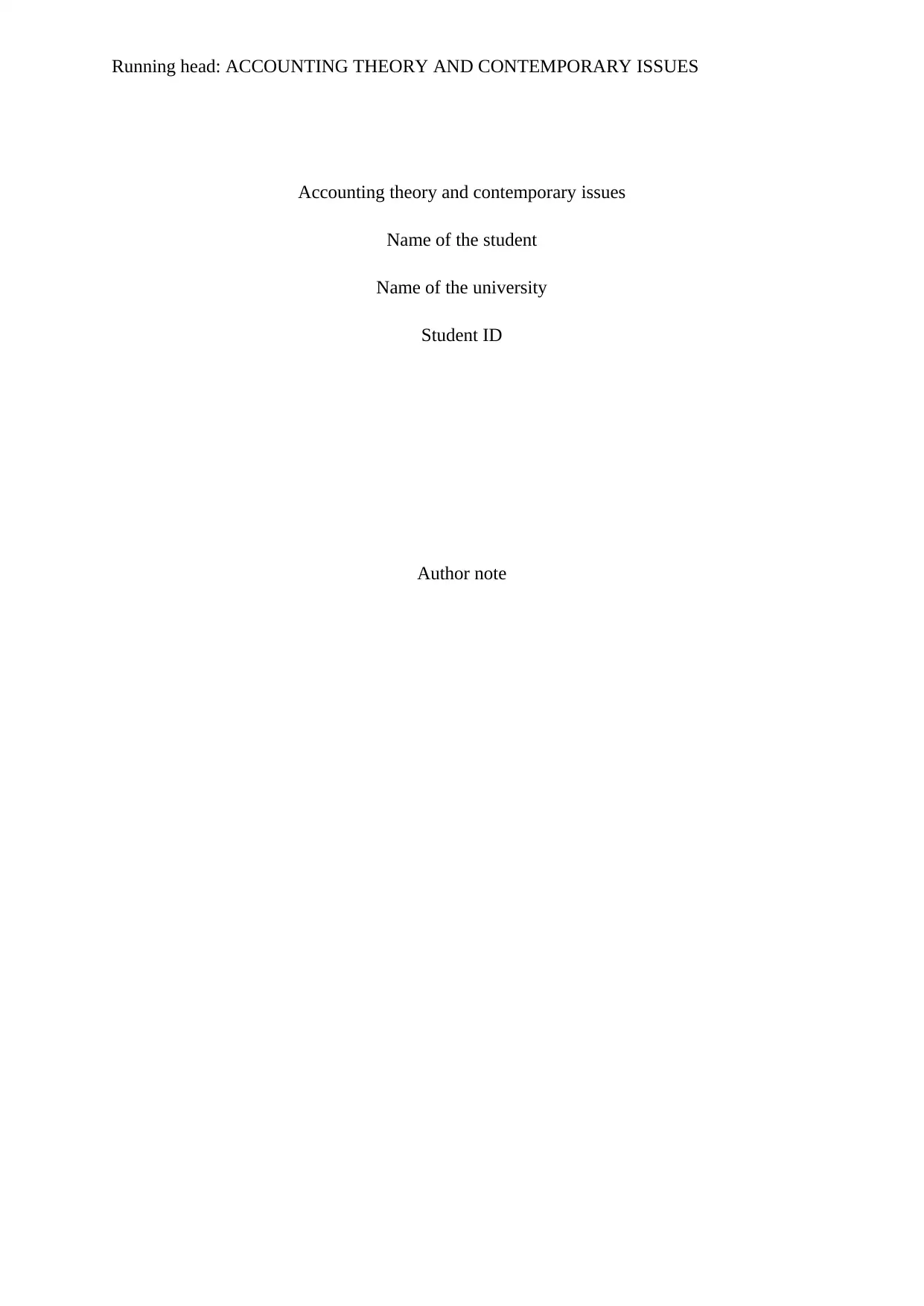
Running head: ACCOUNTING THEORY AND CONTEMPORARY ISSUES
Accounting theory and contemporary issues
Name of the student
Name of the university
Student ID
Author note
Accounting theory and contemporary issues
Name of the student
Name of the university
Student ID
Author note
Paraphrase This Document
Need a fresh take? Get an instant paraphrase of this document with our AI Paraphraser
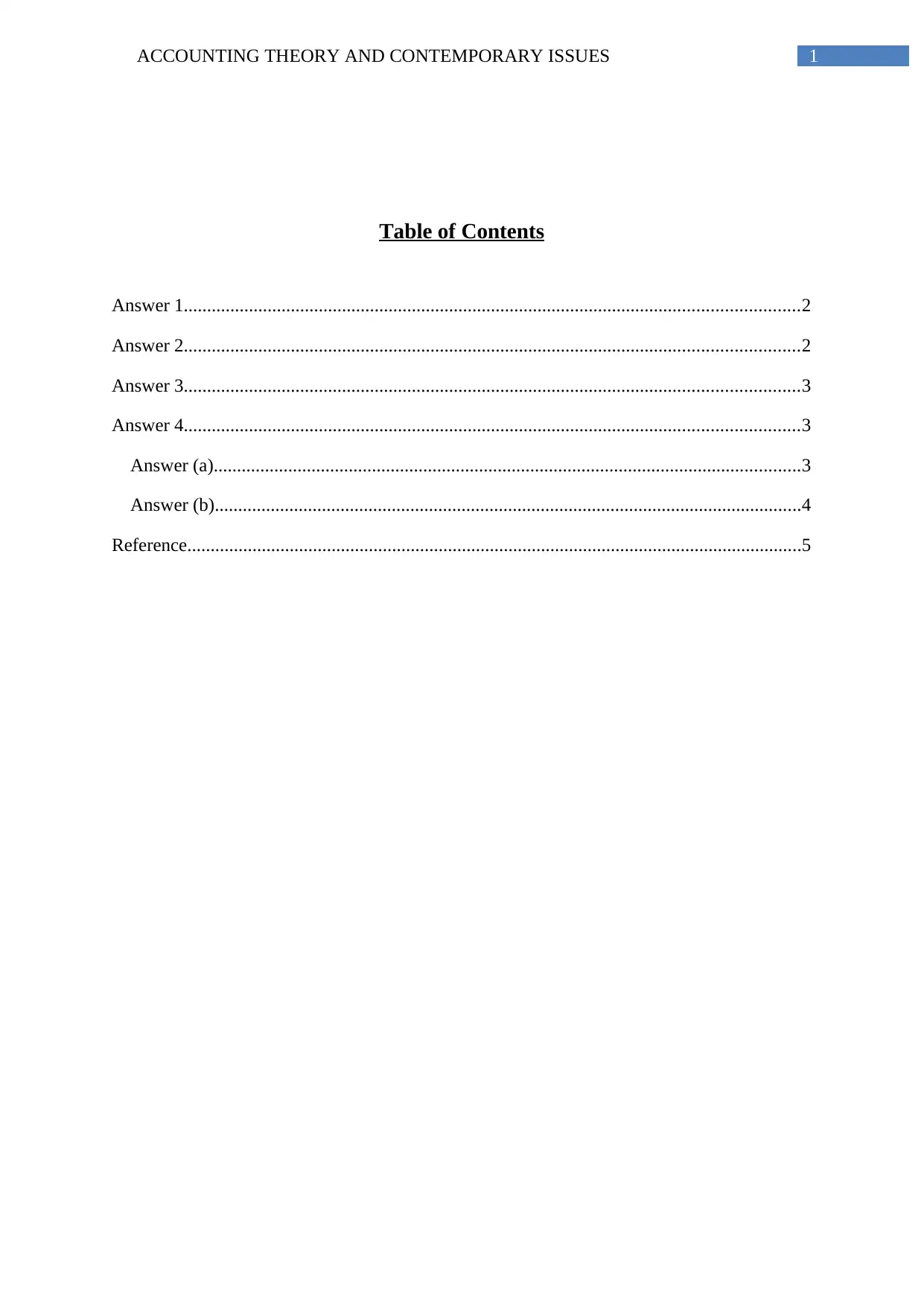
1ACCOUNTING THEORY AND CONTEMPORARY ISSUES
Table of Contents
Answer 1....................................................................................................................................2
Answer 2....................................................................................................................................2
Answer 3....................................................................................................................................3
Answer 4....................................................................................................................................3
Answer (a)..............................................................................................................................3
Answer (b)..............................................................................................................................4
Reference....................................................................................................................................5
Table of Contents
Answer 1....................................................................................................................................2
Answer 2....................................................................................................................................2
Answer 3....................................................................................................................................3
Answer 4....................................................................................................................................3
Answer (a)..............................................................................................................................3
Answer (b)..............................................................................................................................4
Reference....................................................................................................................................5
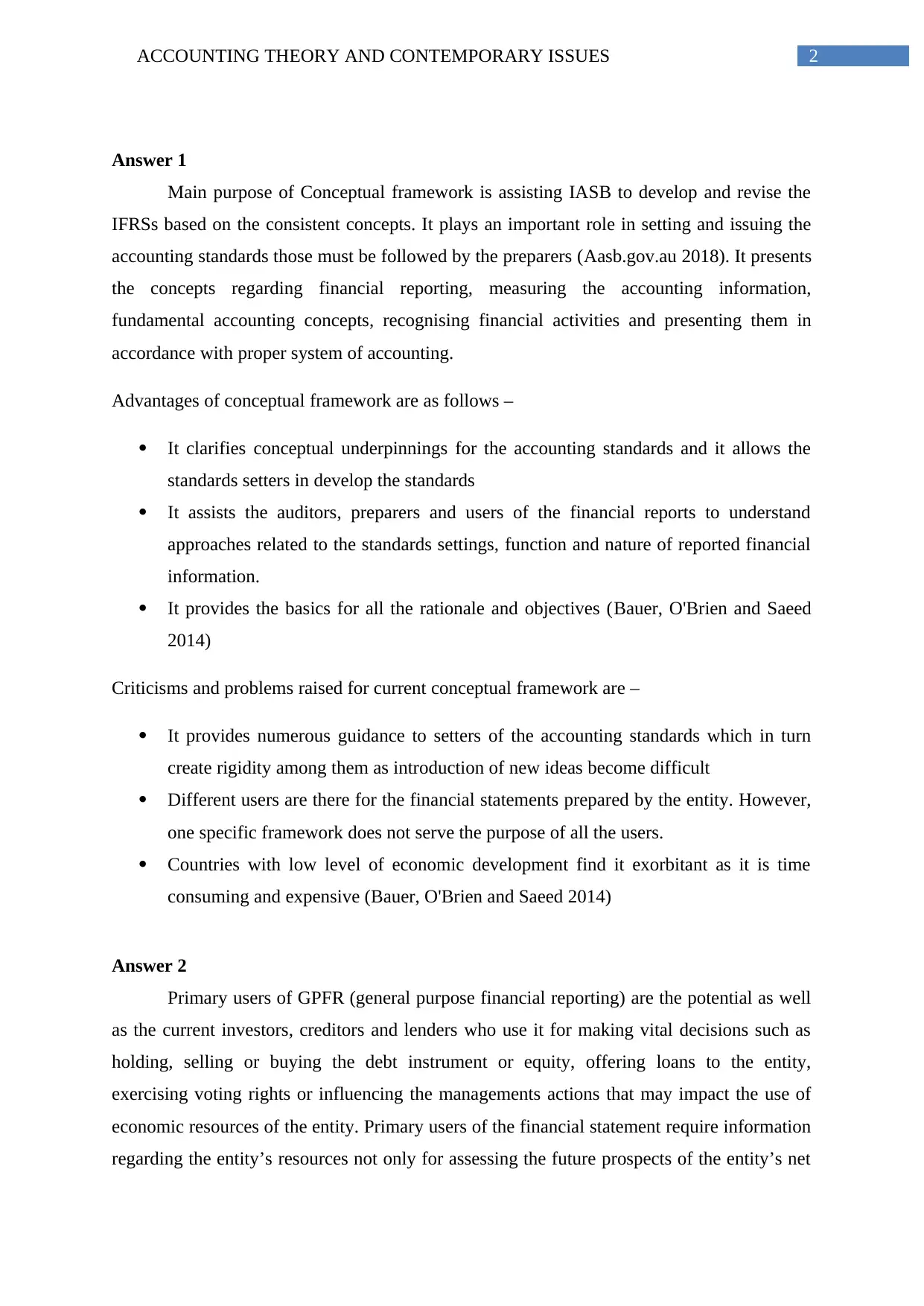
2ACCOUNTING THEORY AND CONTEMPORARY ISSUES
Answer 1
Main purpose of Conceptual framework is assisting IASB to develop and revise the
IFRSs based on the consistent concepts. It plays an important role in setting and issuing the
accounting standards those must be followed by the preparers (Aasb.gov.au 2018). It presents
the concepts regarding financial reporting, measuring the accounting information,
fundamental accounting concepts, recognising financial activities and presenting them in
accordance with proper system of accounting.
Advantages of conceptual framework are as follows –
It clarifies conceptual underpinnings for the accounting standards and it allows the
standards setters in develop the standards
It assists the auditors, preparers and users of the financial reports to understand
approaches related to the standards settings, function and nature of reported financial
information.
It provides the basics for all the rationale and objectives (Bauer, O'Brien and Saeed
2014)
Criticisms and problems raised for current conceptual framework are –
It provides numerous guidance to setters of the accounting standards which in turn
create rigidity among them as introduction of new ideas become difficult
Different users are there for the financial statements prepared by the entity. However,
one specific framework does not serve the purpose of all the users.
Countries with low level of economic development find it exorbitant as it is time
consuming and expensive (Bauer, O'Brien and Saeed 2014)
Answer 2
Primary users of GPFR (general purpose financial reporting) are the potential as well
as the current investors, creditors and lenders who use it for making vital decisions such as
holding, selling or buying the debt instrument or equity, offering loans to the entity,
exercising voting rights or influencing the managements actions that may impact the use of
economic resources of the entity. Primary users of the financial statement require information
regarding the entity’s resources not only for assessing the future prospects of the entity’s net
Answer 1
Main purpose of Conceptual framework is assisting IASB to develop and revise the
IFRSs based on the consistent concepts. It plays an important role in setting and issuing the
accounting standards those must be followed by the preparers (Aasb.gov.au 2018). It presents
the concepts regarding financial reporting, measuring the accounting information,
fundamental accounting concepts, recognising financial activities and presenting them in
accordance with proper system of accounting.
Advantages of conceptual framework are as follows –
It clarifies conceptual underpinnings for the accounting standards and it allows the
standards setters in develop the standards
It assists the auditors, preparers and users of the financial reports to understand
approaches related to the standards settings, function and nature of reported financial
information.
It provides the basics for all the rationale and objectives (Bauer, O'Brien and Saeed
2014)
Criticisms and problems raised for current conceptual framework are –
It provides numerous guidance to setters of the accounting standards which in turn
create rigidity among them as introduction of new ideas become difficult
Different users are there for the financial statements prepared by the entity. However,
one specific framework does not serve the purpose of all the users.
Countries with low level of economic development find it exorbitant as it is time
consuming and expensive (Bauer, O'Brien and Saeed 2014)
Answer 2
Primary users of GPFR (general purpose financial reporting) are the potential as well
as the current investors, creditors and lenders who use it for making vital decisions such as
holding, selling or buying the debt instrument or equity, offering loans to the entity,
exercising voting rights or influencing the managements actions that may impact the use of
economic resources of the entity. Primary users of the financial statement require information
regarding the entity’s resources not only for assessing the future prospects of the entity’s net
⊘ This is a preview!⊘
Do you want full access?
Subscribe today to unlock all pages.

Trusted by 1+ million students worldwide
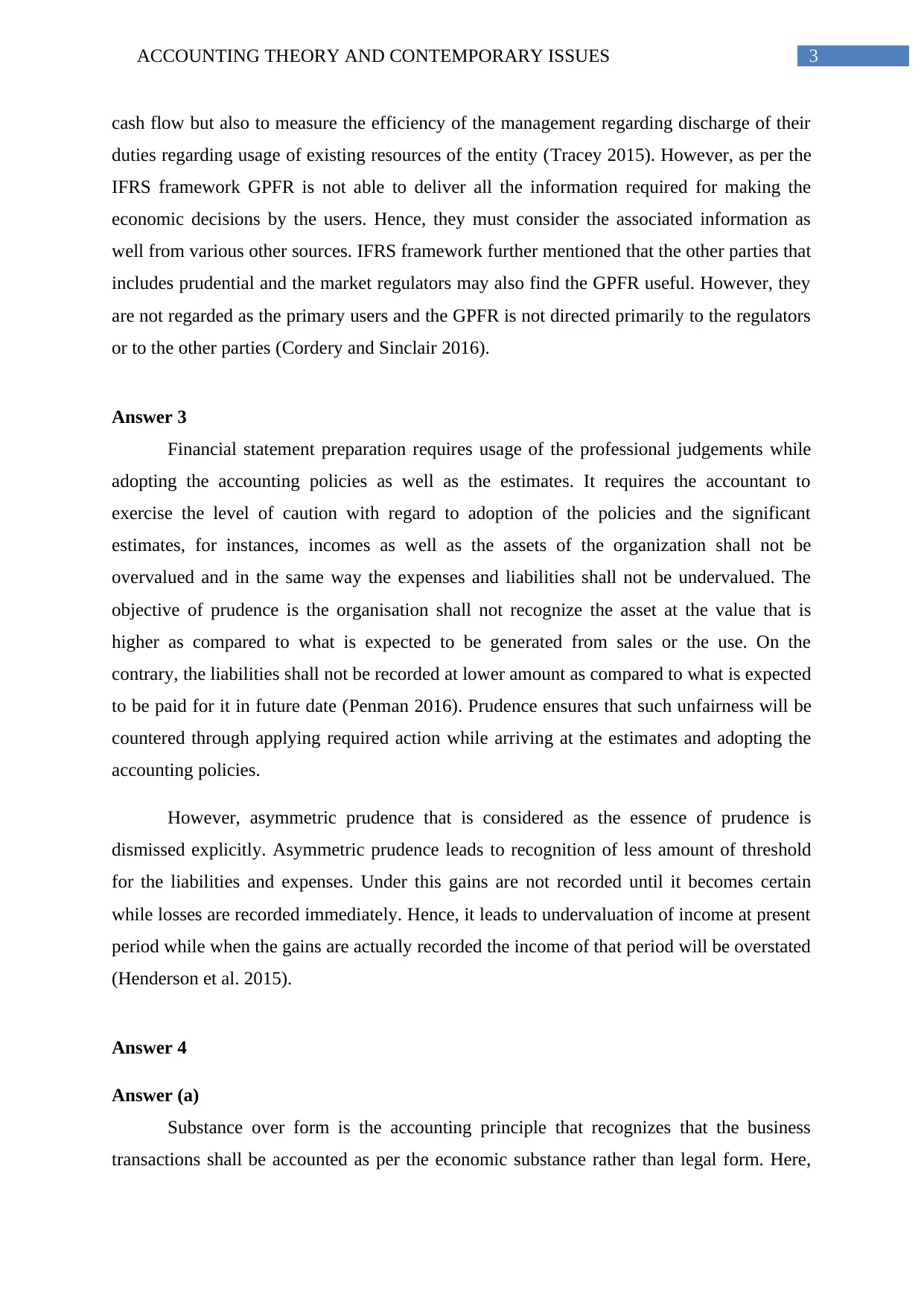
3ACCOUNTING THEORY AND CONTEMPORARY ISSUES
cash flow but also to measure the efficiency of the management regarding discharge of their
duties regarding usage of existing resources of the entity (Tracey 2015). However, as per the
IFRS framework GPFR is not able to deliver all the information required for making the
economic decisions by the users. Hence, they must consider the associated information as
well from various other sources. IFRS framework further mentioned that the other parties that
includes prudential and the market regulators may also find the GPFR useful. However, they
are not regarded as the primary users and the GPFR is not directed primarily to the regulators
or to the other parties (Cordery and Sinclair 2016).
Answer 3
Financial statement preparation requires usage of the professional judgements while
adopting the accounting policies as well as the estimates. It requires the accountant to
exercise the level of caution with regard to adoption of the policies and the significant
estimates, for instances, incomes as well as the assets of the organization shall not be
overvalued and in the same way the expenses and liabilities shall not be undervalued. The
objective of prudence is the organisation shall not recognize the asset at the value that is
higher as compared to what is expected to be generated from sales or the use. On the
contrary, the liabilities shall not be recorded at lower amount as compared to what is expected
to be paid for it in future date (Penman 2016). Prudence ensures that such unfairness will be
countered through applying required action while arriving at the estimates and adopting the
accounting policies.
However, asymmetric prudence that is considered as the essence of prudence is
dismissed explicitly. Asymmetric prudence leads to recognition of less amount of threshold
for the liabilities and expenses. Under this gains are not recorded until it becomes certain
while losses are recorded immediately. Hence, it leads to undervaluation of income at present
period while when the gains are actually recorded the income of that period will be overstated
(Henderson et al. 2015).
Answer 4
Answer (a)
Substance over form is the accounting principle that recognizes that the business
transactions shall be accounted as per the economic substance rather than legal form. Here,
cash flow but also to measure the efficiency of the management regarding discharge of their
duties regarding usage of existing resources of the entity (Tracey 2015). However, as per the
IFRS framework GPFR is not able to deliver all the information required for making the
economic decisions by the users. Hence, they must consider the associated information as
well from various other sources. IFRS framework further mentioned that the other parties that
includes prudential and the market regulators may also find the GPFR useful. However, they
are not regarded as the primary users and the GPFR is not directed primarily to the regulators
or to the other parties (Cordery and Sinclair 2016).
Answer 3
Financial statement preparation requires usage of the professional judgements while
adopting the accounting policies as well as the estimates. It requires the accountant to
exercise the level of caution with regard to adoption of the policies and the significant
estimates, for instances, incomes as well as the assets of the organization shall not be
overvalued and in the same way the expenses and liabilities shall not be undervalued. The
objective of prudence is the organisation shall not recognize the asset at the value that is
higher as compared to what is expected to be generated from sales or the use. On the
contrary, the liabilities shall not be recorded at lower amount as compared to what is expected
to be paid for it in future date (Penman 2016). Prudence ensures that such unfairness will be
countered through applying required action while arriving at the estimates and adopting the
accounting policies.
However, asymmetric prudence that is considered as the essence of prudence is
dismissed explicitly. Asymmetric prudence leads to recognition of less amount of threshold
for the liabilities and expenses. Under this gains are not recorded until it becomes certain
while losses are recorded immediately. Hence, it leads to undervaluation of income at present
period while when the gains are actually recorded the income of that period will be overstated
(Henderson et al. 2015).
Answer 4
Answer (a)
Substance over form is the accounting principle that recognizes that the business
transactions shall be accounted as per the economic substance rather than legal form. Here,
Paraphrase This Document
Need a fresh take? Get an instant paraphrase of this document with our AI Paraphraser
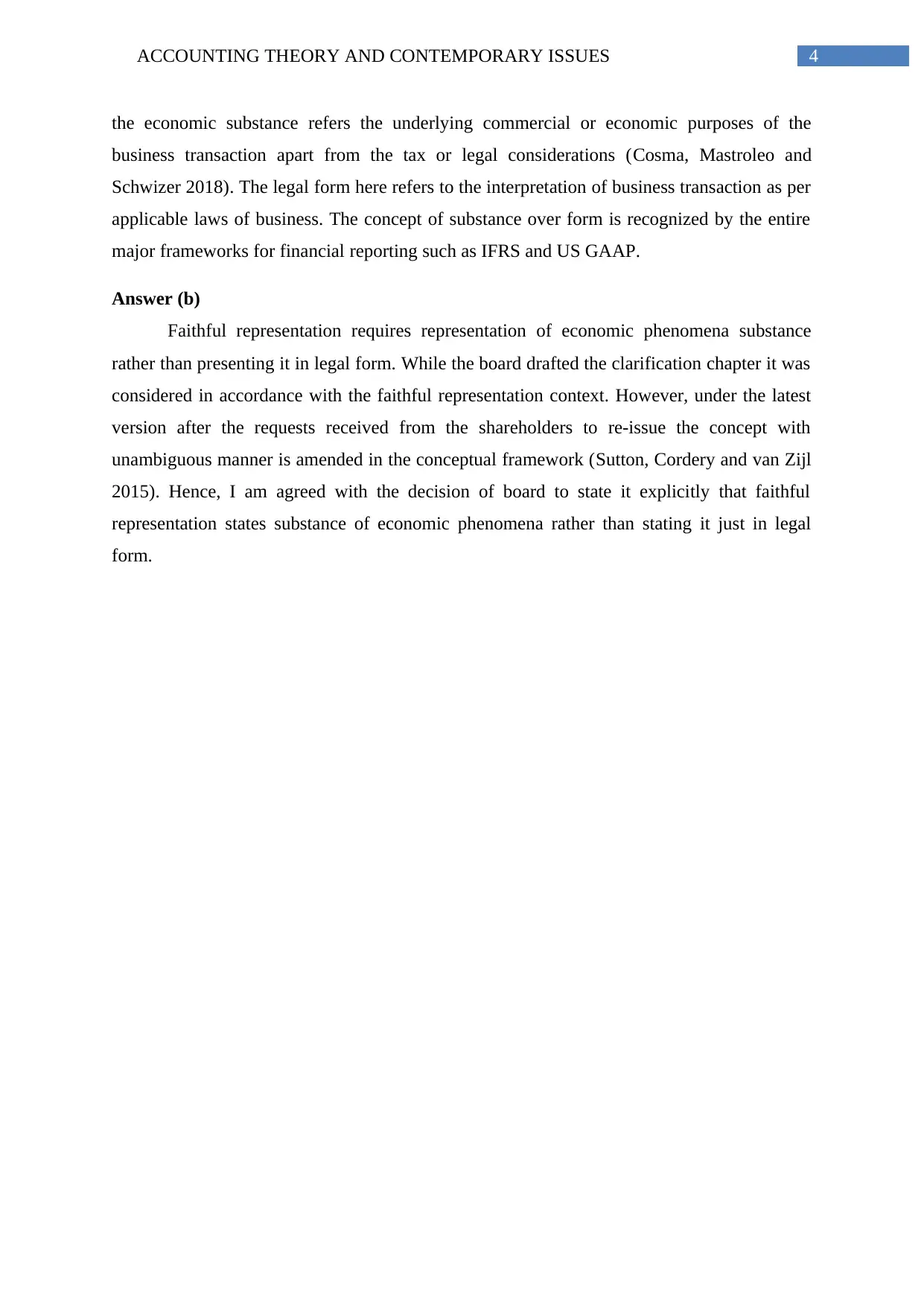
4ACCOUNTING THEORY AND CONTEMPORARY ISSUES
the economic substance refers the underlying commercial or economic purposes of the
business transaction apart from the tax or legal considerations (Cosma, Mastroleo and
Schwizer 2018). The legal form here refers to the interpretation of business transaction as per
applicable laws of business. The concept of substance over form is recognized by the entire
major frameworks for financial reporting such as IFRS and US GAAP.
Answer (b)
Faithful representation requires representation of economic phenomena substance
rather than presenting it in legal form. While the board drafted the clarification chapter it was
considered in accordance with the faithful representation context. However, under the latest
version after the requests received from the shareholders to re-issue the concept with
unambiguous manner is amended in the conceptual framework (Sutton, Cordery and van Zijl
2015). Hence, I am agreed with the decision of board to state it explicitly that faithful
representation states substance of economic phenomena rather than stating it just in legal
form.
the economic substance refers the underlying commercial or economic purposes of the
business transaction apart from the tax or legal considerations (Cosma, Mastroleo and
Schwizer 2018). The legal form here refers to the interpretation of business transaction as per
applicable laws of business. The concept of substance over form is recognized by the entire
major frameworks for financial reporting such as IFRS and US GAAP.
Answer (b)
Faithful representation requires representation of economic phenomena substance
rather than presenting it in legal form. While the board drafted the clarification chapter it was
considered in accordance with the faithful representation context. However, under the latest
version after the requests received from the shareholders to re-issue the concept with
unambiguous manner is amended in the conceptual framework (Sutton, Cordery and van Zijl
2015). Hence, I am agreed with the decision of board to state it explicitly that faithful
representation states substance of economic phenomena rather than stating it just in legal
form.
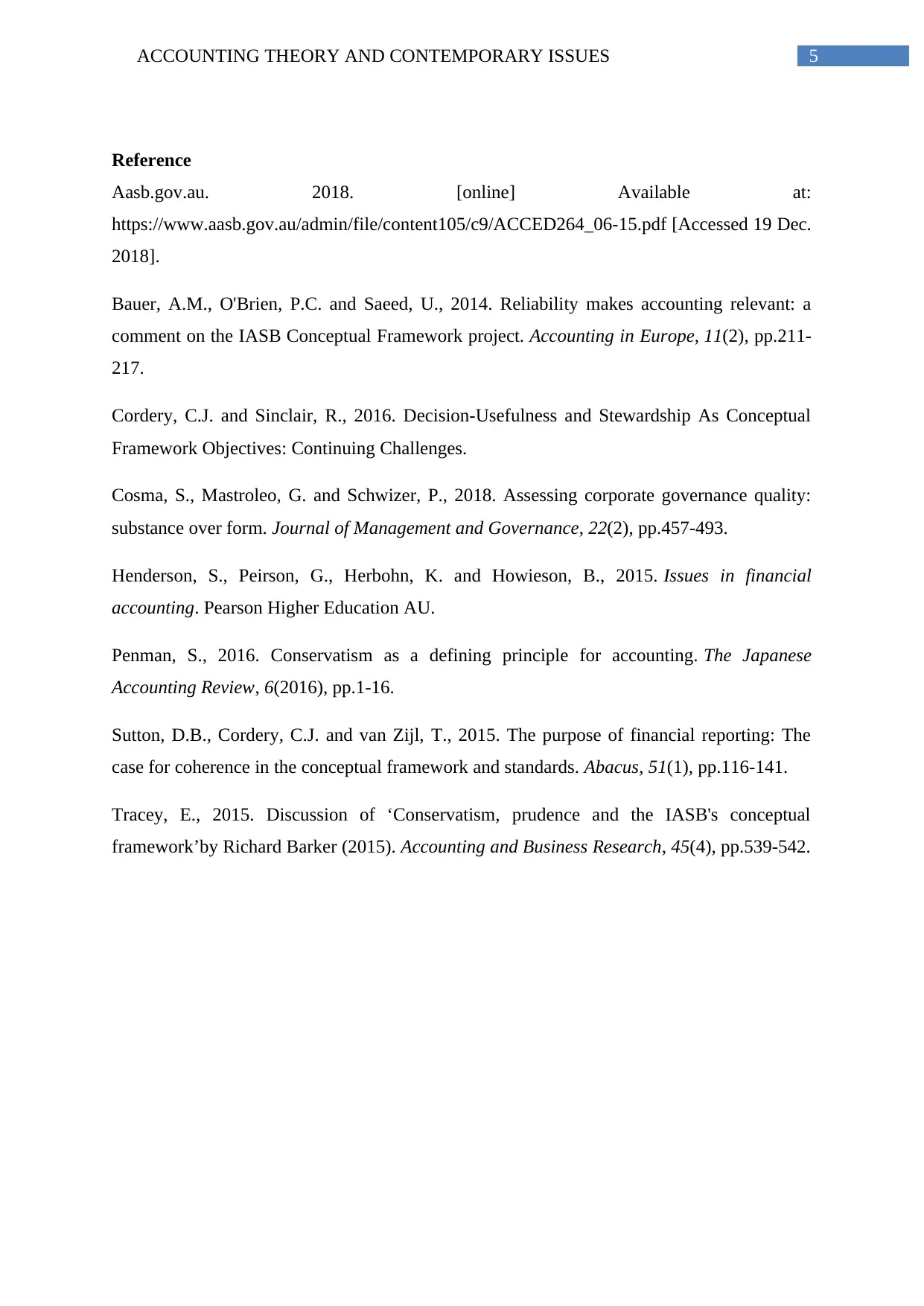
5ACCOUNTING THEORY AND CONTEMPORARY ISSUES
Reference
Aasb.gov.au. 2018. [online] Available at:
https://www.aasb.gov.au/admin/file/content105/c9/ACCED264_06-15.pdf [Accessed 19 Dec.
2018].
Bauer, A.M., O'Brien, P.C. and Saeed, U., 2014. Reliability makes accounting relevant: a
comment on the IASB Conceptual Framework project. Accounting in Europe, 11(2), pp.211-
217.
Cordery, C.J. and Sinclair, R., 2016. Decision-Usefulness and Stewardship As Conceptual
Framework Objectives: Continuing Challenges.
Cosma, S., Mastroleo, G. and Schwizer, P., 2018. Assessing corporate governance quality:
substance over form. Journal of Management and Governance, 22(2), pp.457-493.
Henderson, S., Peirson, G., Herbohn, K. and Howieson, B., 2015. Issues in financial
accounting. Pearson Higher Education AU.
Penman, S., 2016. Conservatism as a defining principle for accounting. The Japanese
Accounting Review, 6(2016), pp.1-16.
Sutton, D.B., Cordery, C.J. and van Zijl, T., 2015. The purpose of financial reporting: The
case for coherence in the conceptual framework and standards. Abacus, 51(1), pp.116-141.
Tracey, E., 2015. Discussion of ‘Conservatism, prudence and the IASB's conceptual
framework’by Richard Barker (2015). Accounting and Business Research, 45(4), pp.539-542.
Reference
Aasb.gov.au. 2018. [online] Available at:
https://www.aasb.gov.au/admin/file/content105/c9/ACCED264_06-15.pdf [Accessed 19 Dec.
2018].
Bauer, A.M., O'Brien, P.C. and Saeed, U., 2014. Reliability makes accounting relevant: a
comment on the IASB Conceptual Framework project. Accounting in Europe, 11(2), pp.211-
217.
Cordery, C.J. and Sinclair, R., 2016. Decision-Usefulness and Stewardship As Conceptual
Framework Objectives: Continuing Challenges.
Cosma, S., Mastroleo, G. and Schwizer, P., 2018. Assessing corporate governance quality:
substance over form. Journal of Management and Governance, 22(2), pp.457-493.
Henderson, S., Peirson, G., Herbohn, K. and Howieson, B., 2015. Issues in financial
accounting. Pearson Higher Education AU.
Penman, S., 2016. Conservatism as a defining principle for accounting. The Japanese
Accounting Review, 6(2016), pp.1-16.
Sutton, D.B., Cordery, C.J. and van Zijl, T., 2015. The purpose of financial reporting: The
case for coherence in the conceptual framework and standards. Abacus, 51(1), pp.116-141.
Tracey, E., 2015. Discussion of ‘Conservatism, prudence and the IASB's conceptual
framework’by Richard Barker (2015). Accounting and Business Research, 45(4), pp.539-542.
⊘ This is a preview!⊘
Do you want full access?
Subscribe today to unlock all pages.

Trusted by 1+ million students worldwide
1 out of 6
Related Documents
Your All-in-One AI-Powered Toolkit for Academic Success.
+13062052269
info@desklib.com
Available 24*7 on WhatsApp / Email
![[object Object]](/_next/static/media/star-bottom.7253800d.svg)
Unlock your academic potential
Copyright © 2020–2025 A2Z Services. All Rights Reserved. Developed and managed by ZUCOL.




